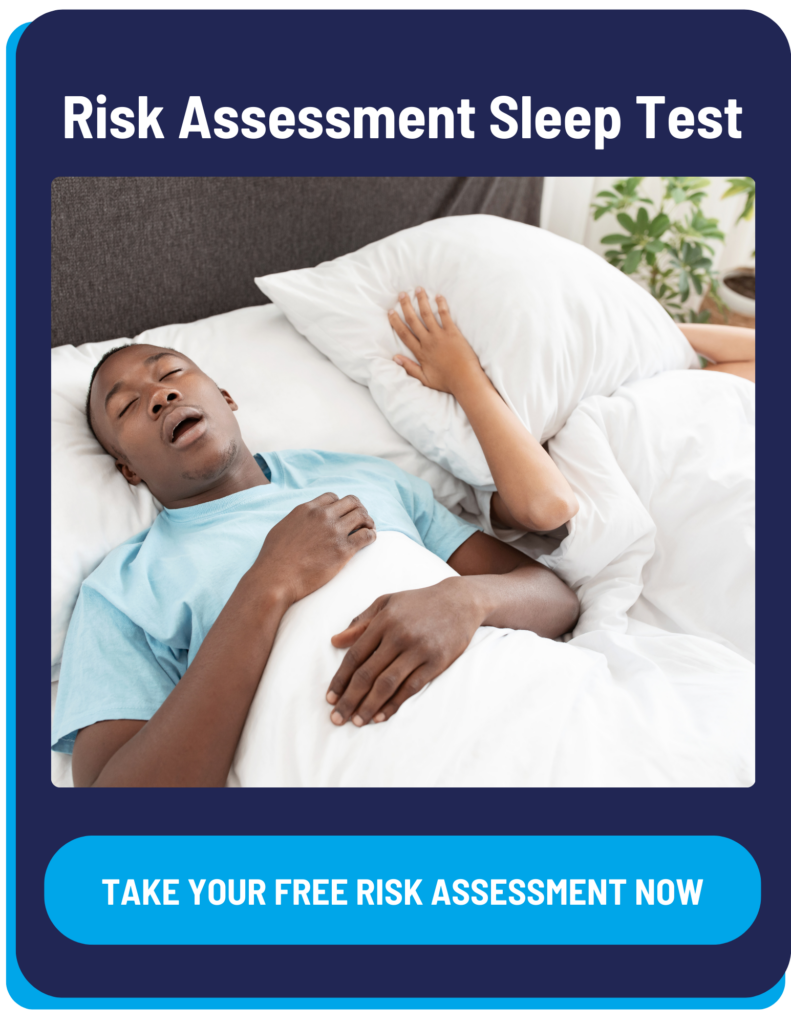If you suspect that you are suffering from sleep apnea, it is important to be tested and treated immediately. Sleep apnea may affect more than just ruining a good night’s sleep. It is directly related to dramatic drops in blood oxygen levels, which can lead to high blood pressure. Sleep apnea affects the body in numerous ways including increasing your risk for diabetes and cardiovascular diseases, such as heart attacks and stroke.1
The more you know about sleep apnea, then the better you can address the condition with proper treatment.

Types of Sleep Apnea
There are two types of sleep apnea. Obstructive sleep apnea (OSA) and central sleep apnea (CSA). OSA causes your upper airway to become partially or completely blocked while sleeping. This blockage forces your diaphragm to work harder to force air through to your lungs.
CSA is a result of your brain not telling your diaphragm to pump air. Unlike OSA, there is no blockage, but rather a disruption in brain activity related to breathing while sleeping. CSA is more likely to occur with severe illness.
OSA is the most common form of sleep apnea and has varying levels of severity. An estimated 22 million Americans suffer from sleep apnea. Of these, 80% of cases of moderate to severe OSA remain undiagnosed and untreated.1 Yet, simple lifestyle changes, including the start of CPAP therapy, can help manage the condition effectively.
Causes of Sleep Apnea
OSA occurs when the muscles in your throat relax as you sleep. When those muscles relax, your airway narrows or closes. Your body cannot get the air it needs, which then lowers the blood oxygen level. Your brain reacts to a drop in blood oxygen by waking you up to reopen your airway. This awakening may cause you to gasp for air, snort, or choke. With sleep apnea, repeated pauses in breathing may occur as many as 30 times per hour. This disrupts your sleep and also affects your ability to rest and rejuvenate.
These factors increase the risk for sleep apnea:
- Excessive body weight. Fat around your upper airway obstructs breathing while you sleep.
- Neck circumference. Thicker necks may lead to narrower airways.
- Use of alcohol or sleeping medications. Sedatives like alcohol and tranquilizers can relax throat muscles and increase the likelihood of apnea episodes.
- Smoking. Smokers are three times more likely to experience OSA. Smoking increases swelling and fluid retention in the upper airway.2
Risk of Untreated Sleep Apnea
The biggest mistake you can make is assuming that sleep apnea is just snoring. But, there are many risks to ignoring effective sleep apnea treatments. Sleep apnea affects the body, resulting in a long-term impact on your health and waking life.
You may already also be experiencing:
- Memory problems
- Weight gain
- Unexplained headaches
- Issues with cardiovascular health
- Daily fatigue
Health Complications of Sleep Apnea
The longer sleep apnea goes untreated the more likely other long-term health issues may occur. Sleep apnea has been linked to Type 2 diabetes,3 adult asthma, cardiovascular disease, stroke, and even accidents caused by impaired driving due to sleep deprivation. Other common health complications associated with sleep apnea include:
Depression: Depression is more common in people suffering from sleep apnea as compared to others. The presence of sleep apnea is associated with depression.
Liver Problems: Sleep apnea escalates the levels of liver enzymes and in some cases, a fatty liver has also been noted.
Weakened Immune System: Sleeping boosts your immune system and if you don’t get enough sleep then you will be more prone to infections and diseases.
Decreased Sexual Desire: Sleep apnea leads to decreased sexual desire. In men, it may then lead to erectile dysfunction.
Acid Reflux: Sleep disorders such as sleep apnea are often diagnosed in people with gastroesophageal reflux disease (GERD), and sleep apnea can worsen heartburn.
Adult Asthma: Sleep apnea can not only trigger asthma symptoms but also intensifies the danger of complications of asthma.
Breathing troubles: Sleep apnea is known to obstruct your breathing while you are sleeping. The apnea may be so short that you do not notice but it can have negative effects if it happens frequently throughout the night.
Low Blood Oxygen Levels: When your breathing is obstructed often during sleep, your body is then deprived of the minimum oxygen required for functioning.
High Blood Sugar Level: Sleep apnea puts you in the danger zone of type 2 diabetes, and vice versa. People with sleep apnea have a hard time managing their diabetes.
Memory Loss: Your ability to secure memories is heavily dependent on your sleeping patterns. If your sleep is being obstructed often, then it can lead to memory loss.
Mental Confusion: Your problem-solving ability is affected if you don’t get quality sleep. You will feel mentally foggy and it can be hard to think clearly.
High Blood Pressure: Sleep apnea has been linked to an increase in blood pressure, a condition that can make it harder to breathe.
Heart Problems: With an increased risk of high blood pressure, you may also suffer from stroke, irregular heart rhythm, and even heart failure.
Abnormal Cholesterol: Patients with sleep apnea are more likely to have high LDL (“bad”) cholesterol levels- a condition that puts them at risk for heart disease.
Fatigue: If you wake up often during the night your body isn’t able to get the rest it needs to function properly the next day.
Effects Of Untreated Sleep Apnea On The Body
On the Respiratory System
Sleep apnea causes blood oxygen levels to drop with every apnea event. An apnea event refers to a pause in breathing, usually for longer than 10 seconds. In severe cases, apneas can occur more than 30 times per hour.
This drop in blood oxygen can worsen symptoms of preexisting conditions, such as COPD and asthma.
On Endocrine System
Obesity and advancing age are both risk factors for diabetes and sleep apnea. More than half of obese individuals are at high risk of developing sleep apnea, and other research suggests that having sleep apnea increases the risk of diabetes. It seems to be a difficult situation. The endocrine system helps regulate the body’s insulin production. Untreated sleep apnea may lead to increased insulin resistance and Type 2 Diabetes. Among individuals with OSA, the prevalence of type 2 diabetes has been estimated to be 15% to 30%, with higher prevalence in those with severe OSA. 1
On Digestive System
As the body loses sleep, hormonal imbalances begin to affect the digestive system. Sleep apnea increases liver enzymes which leads to liver scarring and fatty liver disease. In addition, acid reflux disease is also aggravated by sleep apnea.
Poor sleep also causes imbalances in the hormones that produce hunger and fullness cues. Individuals getting less sleep may eat more and be more at risk for obesity and its complications.
On Circulatory and Cardiovascular Systems
Sleep apnea can also be in relation to high blood pressure or hypertension. This increased strain on the heart increases the risk of heart disease, stroke, and abnormal heart rhythms. Heart failure is common among sleep apnea patients.
During an apnea event, sudden drops in blood oxygen levels raise blood pressure and put a strain on the cardiovascular system. High blood pressure is more likely if you have obstructive sleep apnea. Obstructive sleep apnea will also put you at risk for heart attacks, strokes, and irregular heartbeats like atrial fibrillation. Multiple episodes of low blood oxygen (hypoxia or hypoxemia) in people with heart disease will result in sudden death due to an irregular heartbeat.
Stroke is the most common complication of untreated sleep apnea. Your brain tissue is deprived of oxygen and nutrients when the blood supply to a portion of your brain is disrupted or significantly decreased. Brain cells begin to die in a matter of minutes. Blood pressure and oxygen changes from sleep apnea could cause this, which increases your risk of stroke by causing damage and stress to your blood vessels.
On Nervous Systems
Some types of sleep apnea, such as central sleep apnea, disrupt normal brain functions related to respiration. Central sleep apnea is a sleep disorder in which the brain does not send a signal to breathe to the lungs, resulting in an apnea event.
Central sleep apnea paired with a neurological condition, such as Parkinson’s, may result in additional symptoms like numbness or tingling in the extremities.²
The link between sleep and depression is nuanced, but it is undeniable. Sleep disorders have been shown to cause or lead to depression, and depression has been shown to cause or contribute to sleep problems. Depression symptoms may appear before sleep problems in some individuals, but sleep problems may appear first in others. In any case, sleep issues are linked to more extreme depression.
Sleep apnea is five times more common in people with Alzheimer’s disease than in people without the disease. Approximately half of the dementia patients had sleep apnea at some point after their diagnosis. Sleep apnea patients developed moderate cognitive impairment 10 years earlier than those who did not have sleep apnea.
On Reproductive Systems
Sleep apnea may cause erectile dysfunction in men and reduce the desire for sex. In addition to health and mental health, lack of sleep can impact healthy relationships.
Obstructive sleep apnea affects women’s sexual lives in the same way as it affects men. Several studies have discovered strong links between obstructive sleep apnea and female sexual dysfunction. Problems with sexual function, such as sensation and desire, become more severe as obstructive sleep apnea worsens.
Treatment Options for Sleep Apnea
If you stop breathing while sleeping this is an apnea event and may mean you have sleep apnea. There are different types of treatments for sleep apnea. They are:
Lifestyle Changes: If you are suffering from mild sleep apnea then lifestyle changes or home remedies can help, like losing weight, stopping using sleeping pills and alcohol, changes to your sleep position, treating allergies, and also quitting smoking.
Mechanical Therapy: The most preferable treatment for sleep apnea is PAP therapy or Positive Airway Pressure. During this therapy, patients wear masks that cover the face and the mouth. A PAP machine pushes air to the mask to prevent the airway tissues from collapsing during sleep. The different types of mechanical therapy machines are CPAP, BiPAP, auto CPAP, auto Bi-Level PAP, and ASV or Adaptive Servo-Ventilation.
Surgical Procedures: After a minimum of three months of trial if the other treatments don’t work out another option may be surgery. There are different types of surgery, including the removal and shrinkage of tissues, jaw repositioning, tracheostomy, somnoplasty, uvulopalatopharyngoplasty (UPPP), and also other nasal surgeries.
Start with a Diagnosis For Treatment of Sleep Apnea
The first step to treat sleep apnea is to confirm your diagnosis. Our comprehensive sleep care package allows you to test for sleep apnea in the comfort of your own home.
Here’s how it works:
- With the Complete Care Package, schedule a 10-minute telehealth visit with a healthcare provider to discuss your symptoms, upcoming sleep study, test results, and treatment options.
- A multi-night, disposable home sleep apnea test is mailed to your home to be completed at your convenience.
- A physician analyzes the sleep data and provides a prescription if needed.
- Schedule an optional follow-up appointment (additional fee applies).
- We connect you to sleep experts who can offer customized sleep therapy options, assistance in equipment purchase, and initial set-up.
References:
- American Sleep Apnea Association. Stroke Awareness Month: Untreated sleep apnea and stroke. Accessed September 2019.
- Peters B. Can smoking cigarettes cause snoring and sleep apnea? Verywell Health. 2019 Aug 19.
- Doumit J, Prasad B. Sleep apnea in Type 2 diabetes. Diabetes Spectrum. 2016 Feb;29(1):14-19.




